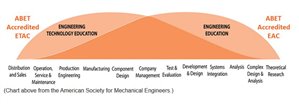



Roy Bowdler:
... if their self-evaluation based on a reasonable comparison with others is that CEng is appropriate, then a suggestion of IEng can be somewhere between difficult and insulting. Some are also too modest.
Frankly, how the h*** does the average Engineer, second guess the interpretation of UK-SPEC by IET Committees & Assessors? Even PRAs have different opinions about the same evidence. ?
Roy,
You raise many perfectly valid comments. I gained CEng more than 25 years ago and yet even now, a large proportion of my work would be classed as "IEng" (with some not even reaching that level). However there is other work that I do that I can proudly point to and say "that is definitely CEng level!"
If a colleague looks at what I am doing as a comparison he/she could decide they are doing much of the same or similar work and therefore must be CEng, yet only actually be doing the bits that are IEng. This is one of the reasons I hate it when people come to me saying "I am working alongside others who are all CEng so I must also be CEng...."
I have certainly found that some Interviewers seem to have a different interpretation of UK Spec, as do some other PRAs, but I think that the majority I have come across are pretty much in line with my interpretation (or perhaps I should state it as I am pretty much in line with them as they are the majority).
Regarding the interpretation of UK Spec, whenever I am giving advice to a candidate I always (nowadays at least, having learned from experience) caveat my advice with the point that this is my opinion based on my interpretation of UK Spec and while this seems to coincide with a fair proportion of interviewers (based on previous candidates passed) there can be variations in interpretation. I therefore try to ensure that the candidate has a sensible understanding of the competence requirement so that if there is probing of the competence there is a chance he/she will understand what is being asked and why - I don't just assure them that what they have written should be ok without an understanding of why it should be ok.
James Walker:
Andy
Nice concept but how could that be managed, monitored?
Oh, absolutely - it would mean putting all registrants regularly back through assessment. And also it would need to be driven by those who could potentially "suffer" from the outcome. This is why I only mention this very occasionally, as I don't see it ever happening in practice!
But if it did happen it wouldn't half boost the credibility of registered engineers.
Cheers,
Andy
Roy Bowdler:
Many institutions, still as they always have, treat the competences as a “light touch bolt on” to academic qualifications. Only the IET would (occasionally) insult an MEng graduate by suggesting that they were “doing IEng work”. This even extends to someone with a CEng accredited BEng degree...
Which is a completely unhelpful approach - we (employers, assessors, accident investigators etc etc) already know if someone has a degree of whatever description - because they have a nice certificate to say so! There's no value to anyone in a PEI awarding some additional letters (in return for an annual fee) just to recognise that. The value comes in the assessment that the engineer not only has that UK&U - from wherever they got it - but is also able to add on that the wider context of how to apply that UK&U in a useful way appropriate and proportionate to their role.
So it's more than, say, whether they are doing innovation - I can think of a case I came across years ago where a PhD engineer was doing fabulous innovative work, but the rest of the company had to run around them to get that work actually applicable to the clients' problems. They were certainly valuable to their company, but I would suggest were not eligible for either CEng or IEng - they did not meet, and had not interest in meeting, the broader aims of UKSPEC in considering their responsibility to their company and their clients (relating to costs, timescales etc), and the application of the work in their clients context.
I really like Alasdair's point that there's a test that you need to be able to show all the competences for the relevant standard whenever they arise, even if that isn't very often. And that's what makes all three registration levels useful, employers etc know they're not "just" getting an HNC / HND / BSc / BEng / MEng / PhD engineer.
Cheers,
Andy
We're about to take you to the IET registration website. Don't worry though, you'll be sent straight back to the community after completing the registration.
Continue to the IET registration site